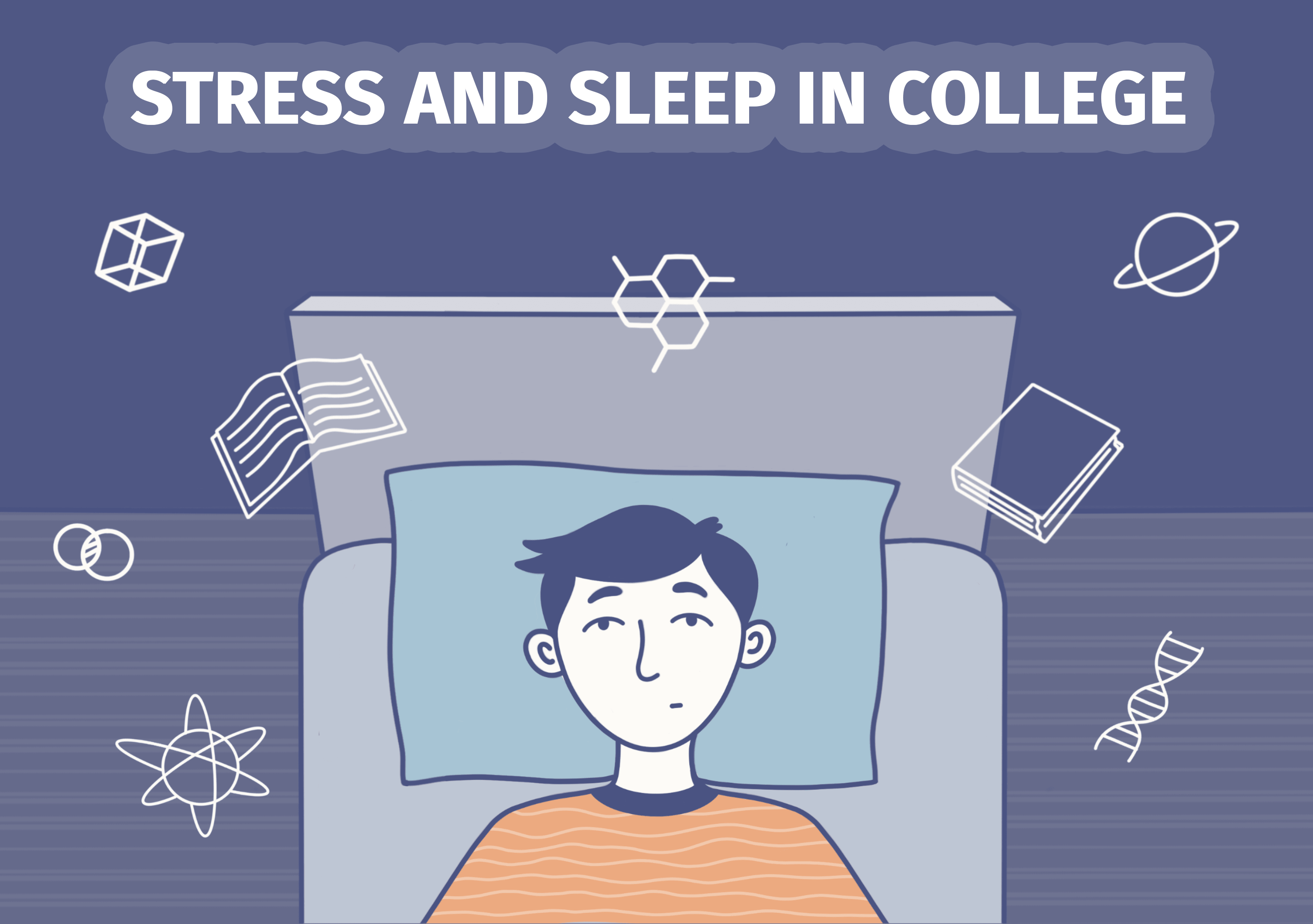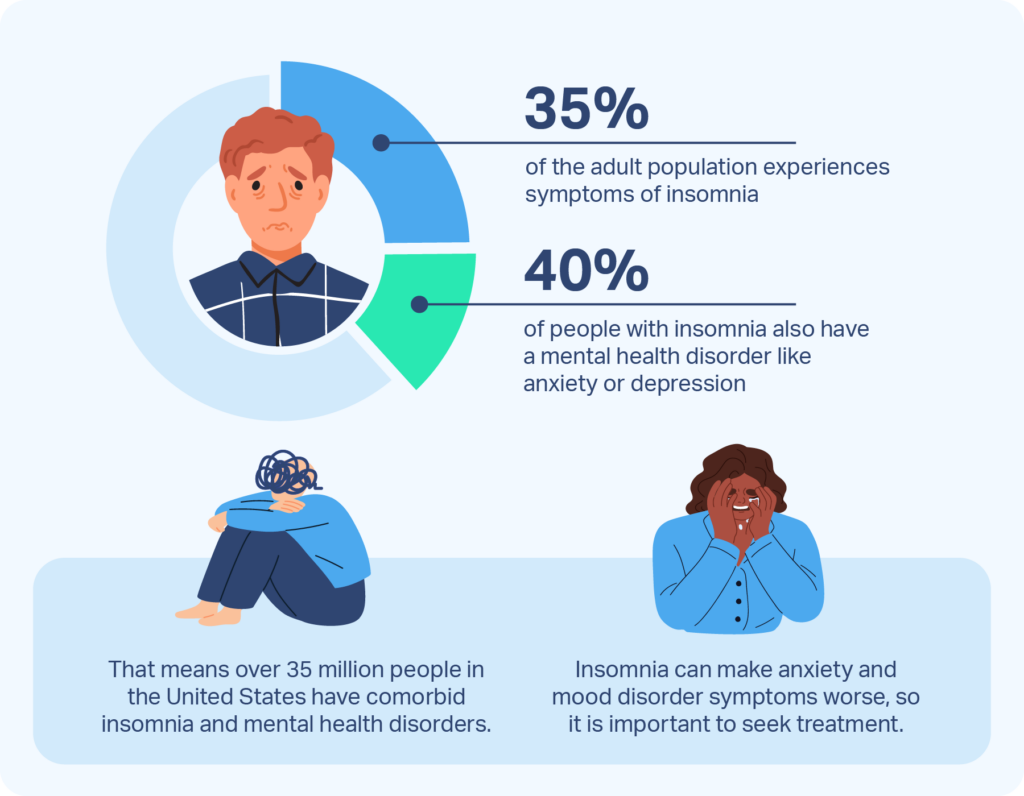College can indeed contribute to insomnia due to stress and irregular schedules. Academic pressures and social changes often disrupt sleep patterns.
College life brings about a unique set of challenges that can impact a student’s sleep. Balancing coursework, exams, and perhaps a social life or job, can lead to increased stress levels, which is a common culprit behind insomnia. College students frequently face irregular sleeping schedules, with late-night study sessions and social activities cutting into their sleep time.
Establishing a consistent sleep routine becomes difficult, leading to a disrupted circadian rhythm. Poor sleep hygiene, such as using electronic devices before bed or consuming caffeine late in the day, also plays a role. These factors combine to create an environment where insomnia can thrive, making it a prevalent issue among the college demographic. Addressing these issues with proper time management and healthy sleep habits is crucial for maintaining a good sleep pattern.
The Sleep Crisis In College
College students often struggle with getting enough sleep. Many factors lead to sleep deprivation during the college years. Studies show that a heavy academic workload can keep students up. Social pressures and maintaining a social life also play a role. Many students are living away from home for the first time.
Stress and anxiety about grades and future plans can make it hard to sleep. The use of electronics like smartphones and laptops before bed can interfere with sleep patterns. Some students might consume caffeine or other stimulants to study, which can affect sleep. Unfamiliar sleeping environments and noisy dorms are also to blame. These issues can lead to a cycle of poor sleep.
A table is not the most suitable format for this content as we are discussing patterns and factors rather than data that needs to be organized in a tabular structure.
Stress And Academia: A Troublesome Duo
College life demands much time and effort. Students face big exam pressures. Such pressures can lead to less sleep. Normally, the brain needs rest to do well. But, exams may cause students to study more and sleep less.
Sleep is important for health. Without it, students can’t think clearly. Trouble with sleep may hurt their results. It may also make them feel sad or worried. Too much to do at college can lead to being overcommitted. This means too many classes, sports, or clubs. It can also cause sleep trouble.
Sleep is as key as studying. Finding a balance is hard but needed. Good sleep can make learning better. It can also make students feel happier and more relaxed.
Lifestyle Choices Affecting Sleep Quality
College students often face irregular sleep schedules. Classes, social events, and studying can lead to erratic sleeping patterns. These changes in routine can disrupt the body’s natural circadian rhythm, which tells us when to sleep. It’s important for students to try and maintain a consistent bedtime.
Substance use, such as alcohol or drugs, can greatly affect sleep. These substances may seem to help at first, but they can actually lead to poorer sleep quality. Caffeine intake, especially from coffee, sodas, or energy drinks, can make it hard to fall asleep. It’s best to avoid caffeine at least 6 hours before bedtime to improve sleep.

Credit: www.mattressclarity.com
The Dorm Room Dilemma: Environment Vs. Sleep
College life often presents a challenge to achieving quality sleep. Dorm rooms are typically rife with noise and distractions. From the laughter and chatter of roommates to the late-night footsteps in hallways, these sounds can disrupt a student’s sleep cycle. Electronics, like phones and laptops, emit blue light and notifications that can further delay bedtime.
Creating a restful dorm room may require effort and creativity. Students can try earplugs or white noise machines to block out sound. Eye masks and room-darkening curtains might help shield against unwanted light. Establishing ‘quiet hours’ with roommates can be a step towards a more conducive sleep environment.
Coping Strategies To Improve Sleep Hygiene
College life often brings sleepless nights. Consistent sleep schedules create patterns that our bodies recognize. Aiming for a regular bedtime and waking time helps set our internal clock. It’s smart to limit naps, especially in the afternoon. Long naps can steal nighttime sleep.
Turning off screens an hour before bed makes a big difference. No phones or computers signals the brain to unwind. Bedrooms must stay cool, dark, and quiet. Creating a restful environment fosters deeper sleep.
- Practice deep breathing or meditation to trigger relaxation.
- Write in a sleep diary to notice patterns.
- Yoga or gentle stretches release body tension.
- Visualization techniques ease the mind into a restful state.

Credit: www.sleepfoundation.org
Addressing Insomnia: Beyond Personal Efforts
Insomnia can hit hard during college years. Stress, a busy schedule, and changes in sleep patterns often lead to sleep problems. Creating a bedtime routine helps a lot. Eating healthy and exercising are great too. But sometimes, these fixes don’t work.
That’s where campus support comes in. Many colleges have health centers and counseling services. These services can suggest ways to get better sleep. They might offer support groups or workshops on managing stress. Remember, it’s okay to ask for help. Getting enough sleep is crucial for academic success and overall health.

Credit: www.labmanager.com
Frequently Asked Questions On Can College Cause Insomnia
Does College Cause Insomnia?
College can contribute to insomnia due to stress, academic pressure, and irregular sleep schedules. It’s important to establish a healthy routine and manage stress effectively.
Why Are College Students So Sleep-deprived?
College students often face sleep deprivation due to academic pressures, social activities, irregular schedules, and sometimes part-time work commitments. Balancing these demands can reduce sleep quality and quantity.
What Affects Sleep In College Students?
Several factors influence sleep in college students, including stress, academic workload, social activities, irregular schedules, and electronic device use before bedtime. These elements can disrupt sleep patterns and quality.
What To Do If You Can’t Sleep At College?
Struggling with sleeplessness in college? Try establishing a consistent sleep schedule, creating a relaxing bedtime routine, and avoiding screens before bed. Ensure your sleep environment is comfortable and quiet. If persistent, seek advice from a campus counselor or healthcare professional.
Conclusion
Wrapping up our exploration into college-induced sleeplessness, it’s clear that higher education can indeed stir insomnia. Stress, erratic schedules, and lifestyle changes play pivotal roles. Adapting time management and sleep hygiene may cushion this impact. For students battling sleepless nights, reaching out for support is key to restoring healthy rest patterns and academic success.

